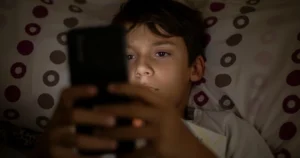As gaming addiction has officially been recognised by the World Health Organisation as a mental health condition, we ask our experts to provide guidance on what it is and what steps parents can take to protect children from developing the condition.
What is gaming addiction?
Gaming Disorder is listed in a draft document that remains to be finalised. It’s significant because the WHO guide is used by doctors to diagnose disease. It lists symptoms such as impaired control over gaming, increased priority and escalation of gaming despite negative consequences.
The problem this creates for parents is that it can confuse healthy enthusiasm and enjoyment with a clinical disorder. We also need to use these labels carefully so as not to trivialise other mental health issues.
That said, it does offer helpful language to identify when children stray from enjoyment and avid gaming into less healthy patterns. While children that won’t stop playing when it’s dinner time are certainly not suffering from a disorder, parents should keep an eye on any child who neglects relationships, exercise, school work and personal hygiene in favour of playing games.
Addiction can mean something very scary to parents and carers. When parents see that their child won’t get off the tablet, gaming console or computer when called, they may bemoan the fact that their child is “addicted” when they actually mean that their child is “overusing online games.” In situations like this, screen balance and perhaps even a digital detox may be recommended.
With the recent inclusion of ‘gaming disorder’ in the WHO’s International Classification of Diseases, parents need to understand what is gaming disorder and how they can prevent their children from developing this ‘addiction.’
Addiction in clinical terms is a pathological state that is diagnosed under certain criteria.
For example, gaming disorder is defined “by impaired control over gaming, increasing priority given to gaming over other activities to the extent that gaming takes precedence over other interests and daily activities, and continuation or escalation of gaming despite the occurrence of negative consequences.” It is important to note that this behaviour pattern has lasted at least 12 months and has resulted in difficulties with family, friends, socializing, education and other areas of functioning.
There is nothing wrong with your child playing and enjoying an online game or video console, but like most things when it comes to the online world it’s a matter of proportion.
While enjoying games is normal, they are designed (many by behavioural scientists) to be engaging after all. The problem arises when children and teenagers start to neglect other areas of their lives in order to play video games, or when the only way they can relax is by playing video games, as, over time, a child may start to turn to video games as a way of coping with difficult life issues.
How to spot gaming addiction
It’s important to look out for signs that your child is becoming too dependant on gaming- you may notice that:
they are talking about their game incessantly, that they play for hours on end and get defensive or even angry and aggressive when made to stop.
Another sign to look out for is if their daily needs like food and sleep are being disrupted, indeed physical symptoms might even arise from spending too much time online such as dry or red eyes, soreness in the fingers, back or neck or complaints of headaches.
Finally, they may appear preoccupied, depressed, or lonely as some games can be quite isolating. If you spot any of these signs in your child it’s a good idea to address the issue as soon as possible.
Based on guidelines established by child protection experts, academics and researchers at EU Kids Online, parents should not automatically assume that their child’s use of digital media is problematic, but they should ask themselves:
- Is my child physically healthy and sleeping enough?
- Is my child connecting socially with family and friends (in any form)?
- Is my child engaged with and achieving in school?
- Is my child pursuing interests and hobbies (in any form)?
- Is my child having fun and learning in their use of digital media?
How can parents prevent gaming addiction in their children?
If the answers to the questions above are yes, then parents consider whether their fears over digital media use are well-founded. If the answers are no, then “these particular parents and children may need to put in place regulations and restrictions in order to address problematic use.”
In other words, parents and carers can tackle the overuse of online games by taking steps to achieve balance in their homes:
- establish screen balance guidelines
- carry out a digital detox
- find creative ways to allow games and tech time, balanced with outdoor or creative non-tech activities
- make sure that games are age-appropriate and content-appropriate
- notice how your children interact with their devices and games (aggressive, irritable, may mean that less screen time is needed)
A final point for parents to remember is that studies suggest that gaming disorder affects only a small proportion of people engaged in online gaming. Don’t panic. Parent.
It’s important that parents don’t just focus on the individual child exhibiting this behaviour. My experience is that it’s as much a parenting issue as it is a childhood disorder. The best way to resolve this in most cases is to encourage parents to be present in the gaming world of their children.
Play together, help set healthy limits and actively find a variety of activities for children to consume online. This approach, particularly started at an early age, will keep gaming safe and sensible for most youngsters.
It’s not easy if you’re not familiar with gaming, but I’ve created succinct weekly videos to help parents who are worried that their children may be addicted to gaming, that can be accessed via my Patreon project.
Put parameters down when it comes to how long they’re allowed to play- don’t allow them to have tech in their rooms after lights out and ensure that they have alternative activities whether they be sports or clubs that make them engage with their peers in the real world- if you are still concerned then seek the help of a professional counsellor.









